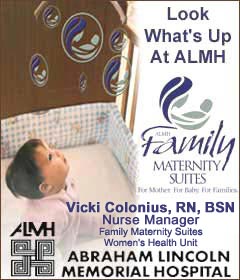|
Improving Fifth Street Road is No. 1 on
the county’s five-year road plan. Hickman said design of the
westernmost five miles is almost complete, but the project won’t be
carried out until funds are in place. He is drafting a letter to
Sen. Peter Fitzgerald asking for federal funding. County board chair
Dale Voyles and Lincoln Mayor Beth Davis will also sign the letter.
Hickman said that funding is largely
dependent on whether Congress passes a transportation enhancement
act. Most federal projects are funded 80/20, meaning that local
government pays 20 percent of the cost.
The county gets substantially more
federal dollars for roads than the city of Lincoln does. Hickman
said the county gets about $250,000 a year in federal rural
transportation funds and $600,000 in motor fuel tax maintenance
funds. The city’s yearly allocation is approximately $110,000. As a
result the county is in a better position to pay its portion of the
Fifth Street Road project. If there is no federal support, Voyles
said the county is prepared to assist the city in the project.

Several board members indicated that
they consider Fifth Street Road a greater priority than improving
the streets around the courthouse square, which the city is
discussing doing with funds available for work on feeder roads.
In the other road issue, Hickman said
the vehicle code has ambiguous terminology regarding weight limits.
The only designated truck route in the county runs between the
quarry and Route 10. He said that for other county roads he cannot
issue a permit for more than 73,283 pounds for a divisible load. A
divisible load is one that can be divided into smaller portions,
like grain or concrete blocks.
Hickman said he understands farmers’
need to transport their product efficiently but warned, "The thing
that eats up roads the most is weight." He is preparing a written
explanation of code rules to distribute to county elevators.
The road and bridge committee is asking
for $558,800 from the motor fuel tax maintenance program to be used
to maintain county roads during 2003. The resolution will be voted
on at Tuesday’s adjourned county board meeting. If passed, it will
be sent to the Illinois Department of Transportation, which approves
MFT money.

In other business at Thursday night’s
board-of-the-whole meeting, Sheriff Steve Nichols said an audit in
progress found doors and locking mechanisms on two cellblocks in
need of replacement. Cost for the two doors is $30,000, but Nichols
said he thinks he can get a better price if he commits to replace
all the cellblock doors over a four-year period. Such a long-term
contract needs board approval. Nichols plans to use half his major
building repair line item to cover the cost this year.
The sheriff is taking applications to
replace correctional officers who have resigned or been terminated.
He said he hopes to hire retiring Department of Corrections
personnel with security backgrounds so the five-week training period
can be waived.
Insurance committee chair Dale Voyles
said the committee has voted to raise underinsured and uninsured
motorist limits on the county auto liability policy from
$20,000/$40,000 to $2 million. The increase carries a yearly price
tag of $1,035. St. Paul is the auto insurance carrier.
[to top of second column in
this article]
|

Premiums on county dental insurance
through Guardian Dental have gone up 4 percent, according to agent
Jerry Palmer. Voyles termed the new rate "pretty reasonable." The
board will vote Tuesday on renewing the policy.
Also up for vote is a petition from J &
S Auto to give enterprise zone designation to the property east of
Kroger’s on Woodlawn Road. A public hearing to consider the
designation is set for 6 p.m. Monday, Dec. 16, at the zoning office
at 529 S. McLean. The Regional Planning Commission has already voted
unanimous approval.
Community Action committee chair Paul
Gleason reported that senior nutrition served 28,531 home-delivered
meals and 12,063 congregate meals in the year ending Sept. 30. Also
during the year 22,589 rides were provided through the
transportation program. He said a transportation coordinator will be
in place by April 1.
Reporting for the tourism committee,
Gleason said Richard Schachtsiek, site superintendent at Postville
and Mount Pulaski courthouses, is taking early retirement at the end
of December. Gleason termed Schachtsiek a "very able director" whose
weekend functions brought thousands of people to the two sites.

It is uncertain whether a new site
superintendent will be named. Board member John Stewart called for a
letter to the state historic preservation office noting
Schachtsiek’s role in organizing volunteers and asking that he be
replaced. Gleason said the 10-year-old Mount Pulaski volunteer
program is a model for similar efforts throughout the state.
Health department administrator Lloyd
Evans explained the three-phase federal smallpox inoculation plan.
In the first phase, to take place in January 2003, core teams from
the health department and Abraham Lincoln Memorial Hospital will go
to Champaign to be inoculated. These are the first people who would
see smallpox patients. Second, first responders such as police,
firefighters and general health care workers will be vaccinated
locally. The goal is to contain an outbreak by protecting those who
would come in contact with victims.
The third phase is inoculation of the
general public, which could occur either before or immediately after
exposure. Evans said he does not know of any single event that has
led to the smallpox initiative. Use of smallpox in a bioterrorist
attack is of low probability but poses a significant risk.

In his first report as county board
chair Voyles announced plans for a January breakfast including
mayors, township supervisors, board members and other county
officials to discuss issues and ideas for the coming year. "It is
imperative to build this coalition," he said, to coordinate the
efforts of county leaders.
The
board-of-the-whole meeting was the first conducted by new vice chair
Gloria Luster. Lloyd Hellman was absent.
[Lynn
Spellman]
|